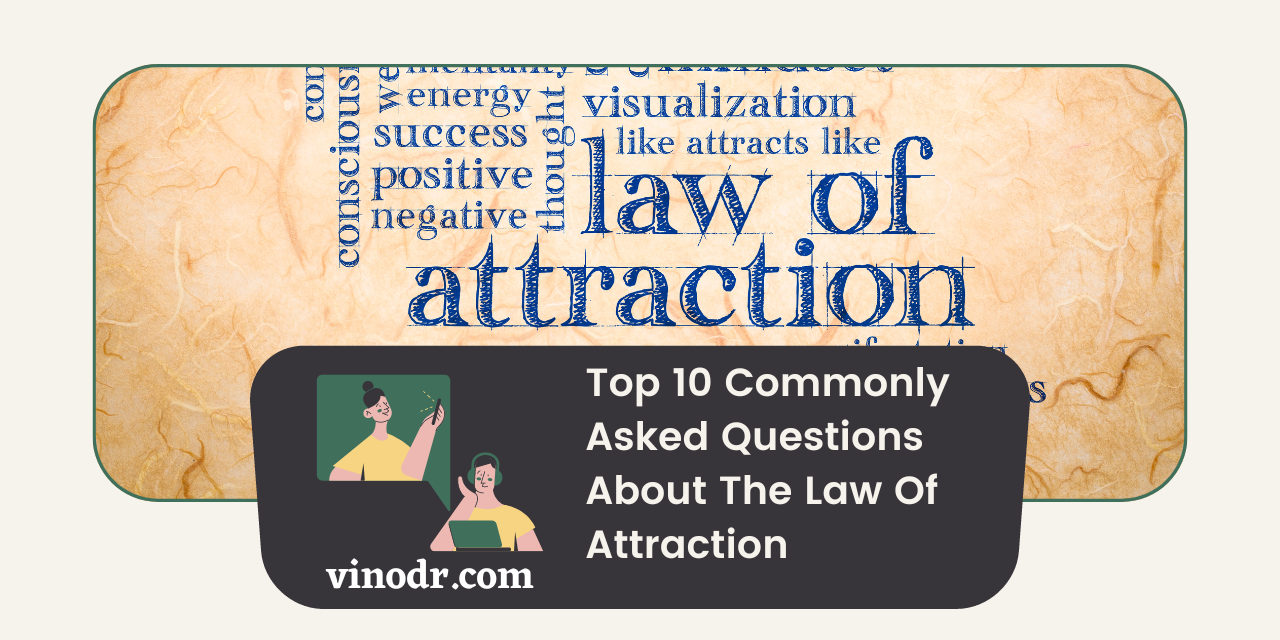Top 10 Commonly Asked Questions About The Law Of Attraction
Top 10 Commonly Asked Questions About The Law Of Attraction
Trending Today
NFT
Social Entrepreneurship
Rat Race – Are you in it?
FOMO Meaning & Thoughts
The Law of Attraction is one of the most popular and controversial concepts in the self-help and self-improvement world. Some people swear by it, while others are Skeptical. In this blog post, I will answer the top 10 most commonly asked questions about the law of attraction. I will provide an overview of what the law of attraction is, how it works, and how you can use it to improve your life. I will also dispel some of the myths and misconceptions surrounding this powerful concept. So, if you’ve ever wondered what the law of attraction is, or how you can use it to your advantage, then this blog post is for you!
What is the law of attraction?
The law of attraction is the idea that whatever we focus on and believe about our lives, we attract more of into our lives. It is based on the idea that the universe is made up of energy, and what we think and feel about our lives can create powerful vibrations that attract similar energies and experiences. In other words, if we focus on positive thoughts and feelings, we can attract more positivity into our lives. It is also commonly referred to as the power of attraction or the law of attraction. The law of attraction is based on the idea that like attracts like, and that by focusing on your thoughts and feelings, you can shape the experiences that you have in your life. It is important to remember that the law of attraction is not a panacea, it is not a magical solution that will solve all of your problems. Instead, it should be used in tandem with other self-improvement strategies such as goal-setting and positive visualization.
What are the basic principles of the law of attraction?
The law of attraction is essentially a three-step process that involves visualization, positive affirmation, and belief. Each step is integral to the process and must be performed in the correct order for the law of attraction to work. The first step is visualization. This involves creating a vivid visualization of your desired outcome. Visualize what it is that you want to manifest in your life, pay attention to the details, and feel the feelings associated with achieving that goal. The second step is positive affirmation. This involves repeating positive mantras or affirmations that are related to your desired outcome. The goal is to affirm what you desire over and over again until it becomes your reality. The last step is belief. Believe that you will achieve your desired outcome and have faith that it is possible. This is the most essential part of the law of attraction and it requires you to trust in yourself and the universe. It is important to remember that the law of attraction works best when you have strong faith that it will work.
How can the law of attraction be used in my life?
The law of attraction can be used in your life to manifest your desired outcomes or goals. By using the principles outlined above, you can create a powerful focus that will attract what you desire. Before you can do this, however, you must be clear on what it is that you want. Take the time to identify what it is that you want to manifest in your life and create a mental image of it. Focus on this image and create positive affirmations related to it. Affirm your desire over and over again and believe that you can achieve it. Finally, take inspired action and do whatever it takes to make your vision come to life.
What is the science behind the law of attraction?
The science behind the law of attraction is fairly complex and it has been the subject of many studies and research projects. In essence, it is based on quantum physics, which is the science of energy and matter. The idea is that energy follows thought and that our thoughts can create powerful vibrations that attract experiences into our life. The science of quantum physics states that energy is a form of frequency and vibration. Therefore, our thoughts, feelings, and vibrations attract similar frequencies and experiences into our life. This is the basis of the law of attraction.
Can the law of attraction be used to manifest my desires?
The answer is yes, the law of attraction can be used to manifest your desires. The key is to have faith and belief that your desired outcome is possible and to create a strong focus on it. Visualize and affirm your desired outcome and take inspired action towards it. The law of attraction is not a quick fix and it will take some time and effort to manifest your desired outcome. Don’t get discouraged if it takes longer than expected. Believe in the power of the law of attraction and have faith that it will work.
What are some success stories about the law of attraction?
There are countless success stories about the law of attraction. People from all walks of life have used this powerful force to manifest their desired outcomes, from getting a promotion at work to creating a loving relationship. One success story is of a woman who used the law of attraction to manifest her dream job. She visualized and affirmed her desired outcome over and over again and eventually landed the job of her dreams. Another success story is of a man who used the law of attraction to manifest a loving relationship. He focused on his desired outcome and eventually met the woman of his dreams. These stories show that the law of attraction can be used to manifest whatever you desire, as long as you stay focused, have faith, and take inspired action. You can find more stories of Jim Carrey, Oprah Winfrey, and other famous personalities in my book “The law of Attraction & Effection”
1. What are some of the challenges people face when using the law of attraction?
One of the main challenges people face when using the law of attraction is doubt and disbelief. It is important to have faith and belief that it can work, otherwise, it won’t. Another challenge is not being clear on what it is that you want. Take the time to identify your desired outcome and create a mental image of it before you begin the law of attraction process. Finally, another challenge is taking inspired action. For anything to happen in your reality, it has to happen first in your mind.
2. Are law of Attraction real?
The “law of attraction” is a concept popularized in New Thought and self-help communities, but it is not scientifically established. Since religion and God are also not scientifically established, we do not have to see them through the scientific lens. For anything to work, first, you should believe that is where it starts. If you believe it’s real then it’s.
When law of attraction doesn’t work?
- Lack of clarity and focus the on desired outcome.
- Negative thoughts and beliefs.
- Difficulty in maintaining a positive and optimistic outlook.
- Not taking aligned actions.
- Resistance to change.
- Difficulty in letting go of past experiences.
- Fear of failure or success.
- Limited understanding of the law of attraction.
These are some of the basic reasons why law of attraction is not working.
3. Which law of attraction technique is best?
The effectiveness of different law of attraction techniques varies from person to person, as individuals have unique beliefs, experiences, and perspectives which are deeply rooted in their subconscious minds. Some commonly used techniques include:
- Visualization
- Affirmations
- Gratitude practices
- Setting goals
- Focusing on positive experiences
The best technique is one that resonates with an individual and they feel comfortable practicing regularly. It’s recommended to experiment with different techniques to see what works best for the individual.
4. Will law of attraction work?
The effectiveness of the “law of attraction” is subjective and based on individual beliefs and experiences. Some people believe that focusing on positive thoughts and visualization can lead to desired outcomes, while others do not see a direct correlation. it’s possible that focusing on positive thoughts and experiences can have indirect benefits, such as improving mood and motivation. Whether or not the law of attraction “works” ultimately depends on one’s perspective and beliefs. Having faith in anything we do will work wonders.
5. Can law of Attraction change DNA?
No, the law of attraction cannot change an individual’s DNA. DNA is a complex molecule that contains genetic information and is responsible for the physical and behavioral characteristics that are passed down from one generation to the next. It is not directly influenced by thoughts, beliefs, or visualization practices. While some alternative or spiritual beliefs propose that thoughts can impact the body and physical reality, there is no scientific evidence to support these claims.
6. Can law of attraction change physical appearance?
No, the law of attraction cannot directly change an individual’s physical appearance. Physical appearance is largely determined by genetics, as well as various environmental factors such as diet and lifestyle choices. While it’s possible that focusing on positive thoughts and visualization can lead to improved self-esteem and body image, this will not alter an individual’s physical appearance. In order to change physical appearance, a person would need to make deliberate changes to their lifestyle and habits, such as following a healthy diet and exercising regularly.
7. Can law of attraction change horoscope?
No, the law of attraction cannot change an individual’s horoscope. Horoscopes are based on the positions of the stars and planets at the time of a person’s birth and are not influenced by thoughts, beliefs, or visualization practices. The idea of the law of attraction suggests that a person’s thoughts and beliefs can influence their experiences and circumstances, but it does not have the power to alter the positions of celestial bodies or change a person’s astrological sign.
8. what law of attraction says about love?
A person can attract experiences and circumstances into their life by focusing their thoughts and energy on positive outcomes. With regards to love, the law of attraction suggest that an individual can attract romantic love into their life by focusing their thoughts and energy on positive experiences and emotions related to love, such as happiness, gratitude, and joy. This can involve practices such as visualization, affirmations, and gratitude journaling. Thinking about the type of person that you want to attract in your life is the first step to start your journey.
9. law of attraction vs astrology
Law of Attraction is the idea that a person can attract experiences and circumstances into their life by focusing their thoughts and energy on positive outcomes. Astrology, on the other hand, is the study of the positions and movements of celestial bodies, such as the sun, moon, and planets, and how they relate to human affairs and natural phenomena. Astrology uses a person’s birth date, time, and place to create a horoscope, which is a representation of the positions of the celestial bodies at that moment. Astrologers use the horoscope to make predictions and offer guidance.
While both Law of Attraction and Astrology offer different methods of understanding and improving one’s life, they are not necessarily mutually exclusive and can be used together if the individual finds value in both beliefs.
10. law of attraction or law of assumption
Law of Attraction and Law of Assumption are similar concepts in the realm of personal development and manifestation. Both beliefs suggest that individuals can shape their experiences and circumstances through their thoughts and beliefs. The Law of Attraction, as described suggests that a person can attract experiences and circumstances into their life by focusing their thoughts and energy on positive outcomes. This involves practices such as visualization, affirmations, and gratitude journaling.
The Law of Assumption, also known as the Law of Expectation, is a similar concept that suggests that a person’s expectations and beliefs can shape their experiences and circumstances. According to this belief, if a person assumes that a certain outcome is possible and focuses their thoughts and energy on that outcome, they are more likely to experience it in their reality. Both concepts suggest that a person’s thoughts and beliefs can influence their experiences and circumstances, but the specific practices and language used may vary between the two beliefs.
Trending Today
NFT
Social Entrepreneurship
Rat Race – Are you in it?
FOMO Meaning & Thoughts





